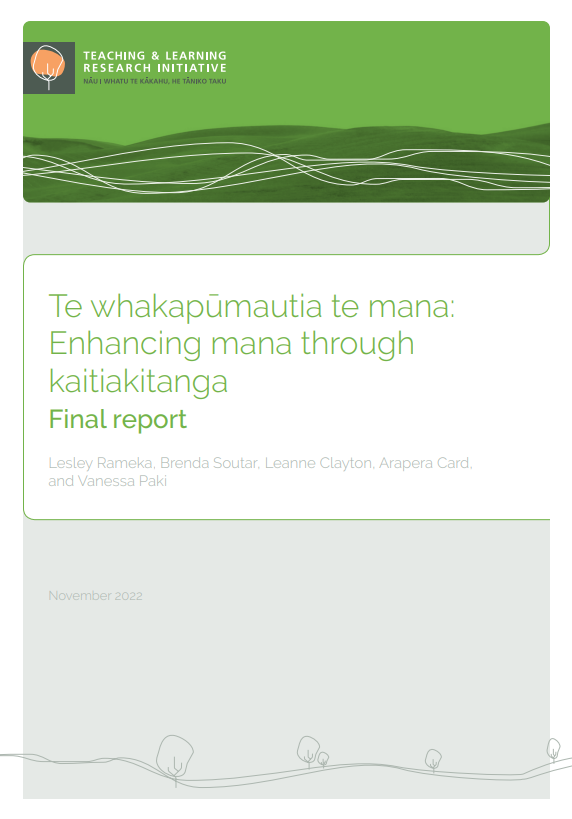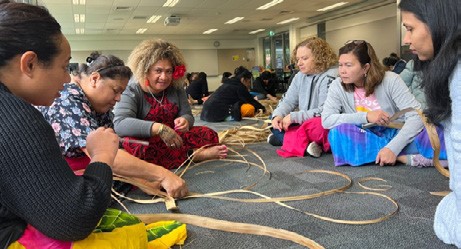On the edge: Shifting teachers’ paradigms for the future
The past 20 years or so have seen increasing concern that our schooling system, set up for a different age, is not able to prepare today’s learners for the fast-changing world they will live and work in. Strong arguments for radical change—not gradual improvement—have been made, from a number of quarters. There is some consensus […]
Moments of wonder, everyday events: Children’s working theories in action
This two-year research project explored children’s working theories in action. We looked at the ways young children expressed their working theories and how these were understood and fostered in Playcentre[1] environments. The findings show ways that children express and develop working theories, how practitioners understand these, and how best to respond to this learning. Key […]
Investigating the relationship between whole-school approaches to education for sustainability and student learning. A summary
Education for sustainability (EfS) has been rapidly growing in New Zealand schools, bringing with it an interest in whole-school approaches to develop EfS and a focus on action competence as a means to understand student learning in this field. It is currently UNESCO’s decade of education for sustainable development, which calls for “a new vision […]
Using multiplication and division contexts to enhance young children’s part–whole thinking in mathematics
Project description This project built on previous research showing that insufficient numbers of children reach expected levels of achievement in mathematics. Māori, Pasifika, and students from lower decile schools are particularly disadvantaged. Young children should be given equitable opportunities to develop their mathematical thinking, particularly in all strategy domains of the New Zealand Number Framework. […]
School achievement: Why summer matters
Introduction The “summer learning effect” is where students’ school literacy achievement plateaus or declines over summer. This limits students’ levels of achievement over time which can create a barrier to decile 1 schools’ effectiveness. It is a well known effect both within New Zealand and worldwide, but there is limited research evidence on how to […]
Connecting curriculum; connecting learning; negotiation and the arts
Introduction This project contributes to the field of curriculum integration and the role of the arts within integrated learning contexts. In particular, it scrutinised integrated inquiries that incorporated drama and visual art with other learning areas. It also examined ways in which children, teachers, and the wider community engaged in arts-based integration. Most of the […]
Children who learn in more than one language: Early childhood teachers afloat in plurilingual seas
Introduction Background, research literature overview, research questions and why they are important to learning and teaching in New Zealand Aotearoa is an increasingly diverse society. The many languages and cultures of children and families raise questions and considerations for early childhood teachers. We designed research to address gaps in our knowledge, by exploring the languages […]
Summer reading to overcome the summer effect
Introduction The school in which this project took place, Papatoetoe Central, was concerned about research evidence that indicated students’ reading achievement dropped after long summer breaks. This drop in achievement, known as “the summer effect”, has been reported in schools in New Zealand and internationally (Alexander, Entwisle, & Olson, 2007; Allington & McGill-Franzen, 2010; McNaughton, […]
Work of teacher educators: Teaching and learning in New Zealand university-based initial teacher education
Introduction We have been studying the cultural constructions and material realities of university-based initial teacher education (ITE) and teacher educators’ work in Aotearoa New Zealand. By examining the work of teacher educators, we have been able to consider how ITE and the academic category of teacher educator is constructed, maintained, and practised within the institution […]
Te Kura Mai i Tawhiti: He Tau Kawekaweā: Building the foundation for whanau educational success and wellbeing; a Kaupapa Māori ECE approach
Introduction Te Kōpae Piripono (TKP), Māori immersion early childhood education (ECE) centre, was recognised by the Ministry of Education in 2005 as a Centre of Innovation (COI), funding a 3-year practitioner research project which looked at whether Whānau Development at Te Kōpae Piripono fosters leadership across all levels of the whānau enhancing children’s learning and […]
The impact of children’s everyday learning on teaching and learning in classrooms and across schools
Tū mātātoa, kei kiriora tō tū[1] Stand strong lest you become complacent A child in this study told us that he had learned he was brave by travelling on a Halloween train journey that engendered fear and trepidation. Months later, this child asked a researcher that his teacher be told he was ‘the brave one’. […]
Literacy and narrative in the early years: Zooming in and zooming out
Introduction This project is about exploring and strengthening young children’s story-telling expertise. Building on research that shows that children’s narrative competence is linked to later literacy learning at school, we wanted to understand more fully how conditions for literacy learning are, and could be, supported within early years education settings. Using a design-based intervention methodology […]
Reengineering an engineering course: How flipped classrooms afford transformative teaching, learning, and workplace competency
Introduction Successful engineering graduates need to understand engineering principles and practices and be able to work in teams, to communicate well, and to work in contexts that can be risky and uncertain (Adamson & DarlingHammond, 2012; Meier, Williams, & Humphreys, 2000). Current trends in engineering education call for the development of students’ technical and non-technical […]
Understand Me: Storied-Conversations as Afa for Strengthening Relationships, Curriculum and Pedagogies
Mā ngā korero tuku iho tātou me ō tātou ao e kitea ai, e rongongia ai, e whaiora ai.[1] E tatou te fauina i tatou ma a tatou si’osi’omaga, e ala iā tatou tala.[2] We craft ourselves and our worlds in stories. Understand Me was born out of an aspirational exploration of ways for teachers […]
Using a wellbeing framework to recognise, value and enhance the broad range of outcomes for learners in adult literacy and numeracy programmes
Aotearoa New Zealand’s attention to adult literacy and numeracy (L+N) education arose from the results of the OECD / Statistics Canada International Literacy surveys begun in the mid-1990s, when, as a nation, we achieved unexpectedly low results for L+N proficiency. The Government responded with an adult L+N strategy (Ministry of Education, 2001) that spellt out […]
Te Whakapūmautia te mana: Enhancing Mana Through Kaitiakitanga

Introduction Wellbeing is fundamental to an individual’s ability to function and live well (Durie, 1998). Wellbeing statistics in New Zealand highlight that Māori have some of the worst levels of educational attainment, high levels of unemployment and incarceration, decreasing levels of home ownership, lower than average incomes, higher than average mortality rates, inequitable access to […]
Pepe meamea in the spirit of the collective: Embedding Samoan indigenous philosophy in ECE for Samoan children under two

Introduction Our approach to research intentionally engaged processes of co-design whereby the study of pepe meamea (Samoan conceptualisation of infants and toddlers) with our research partners ensured that the values and practices of Samoan Indigenous knowledge systems were privileged throughout all stages of the research. The co-design process we collectively premised affirms relationality that grounds […]
